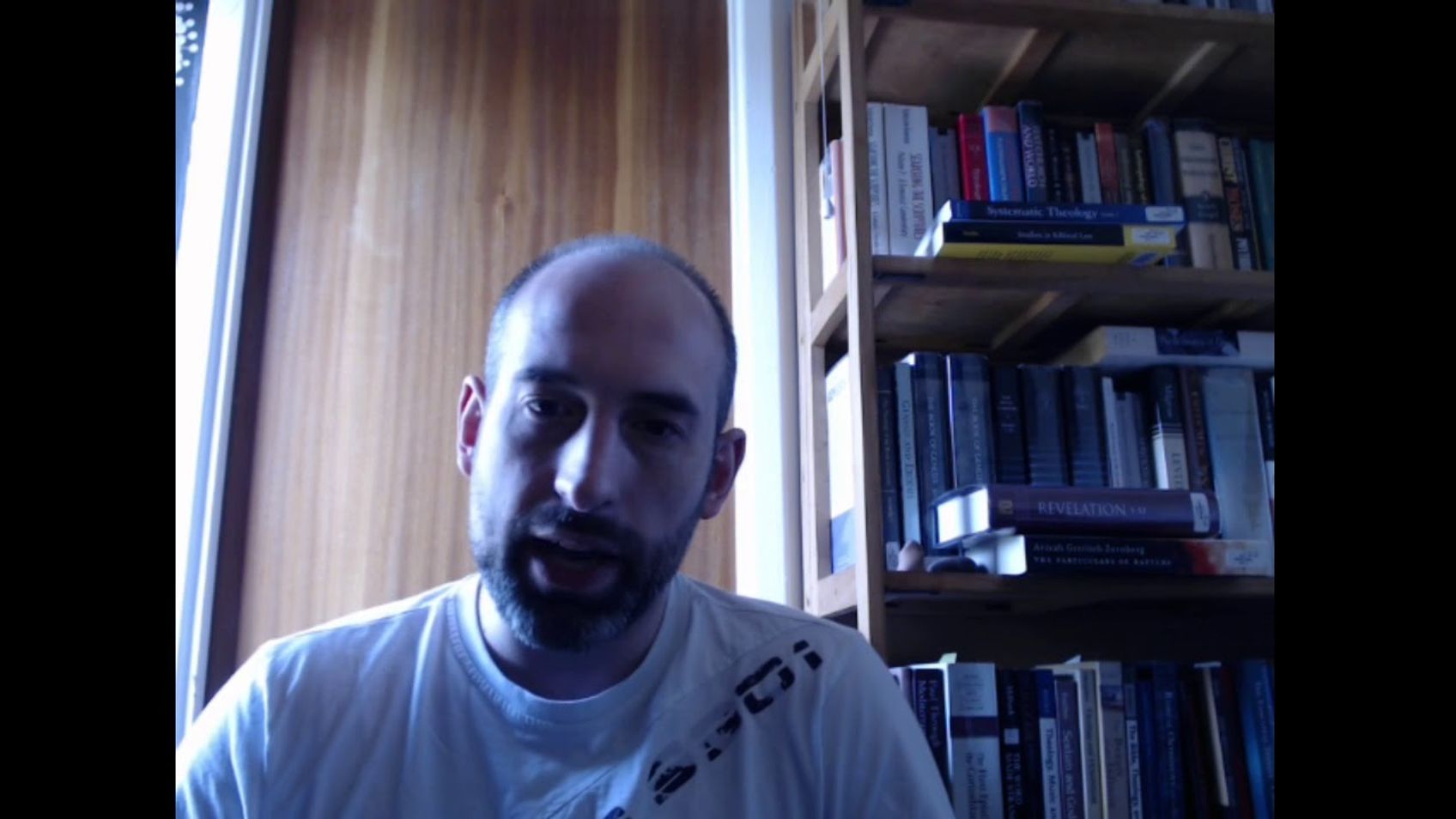Q&A#5 Exegesis, Authorial Intention, and Typology
May 18, 2018

Alastair Roberts
Today's Question: Is the task of exegesis limited to discovering the author's original intention, or can meaning somehow overflow intention? If so, in what way? What guardrails are in place that would enable us to recognize certain readings as off-limits? A common text referenced in these discussions is Matthew 2:15's usage of Hosea 11:1, so I'd be interested to hear your take on that as well.
Leave your own questions in the comments, on my blog, or on my Curious Cat account.
More From Alastair Roberts

Q&A#6 Trinity and Modalism
Alastair Roberts
May 19, 2018
Today's Question: I follow what you are saying about the error of saying that there are three 'centers of consciousness' in God's Triune nature, and h

Q&A#7 Ruth the Moabitess and the Moabite Women of Nehemiah
Alastair Roberts
May 20, 2018
Today's Question: Having recently read both Ruth and Nehemiah, I was struck by the very different ways they relate to the recurring entanglement of Mo

Q&A#8 The Chronology of Genesis 38
Alastair Roberts
May 21, 2018
See this article for context: https://alastairadversaria.com/2006/12/08/the-judah-and-tamar-story-in-its-context/
Today's Question: The story of Juda

Q&A#4 The Threefold Personhood of God
Alastair Roberts
May 17, 2018
Today's Question: You've challenged the idea that the Persons of the Trinity are three distinct 'centers of consciousness'. But, reading the gospels,

Q&A#3 A Biblical Theology of the Household
Alastair Roberts
May 16, 2018
Today's Question: Is there a biblical theology of the household you could outline for us in a YouTube video?
Leave your own questions in the comments

Q&A#2 Why is it the Man rather than the Woman who Leaves Father and Mother in Genesis 2:24?
Alastair Roberts
May 15, 2018
Today's Question: Why is it the man rather than the woman who leaves father and mother in Genesis 2:24?
Leave your own questions in the comments, on
More on OpenTheo

Can You Recommend Good Books with More In-Depth Information and Ideas?
#STRask
January 22, 2026
Questions about good books on Christian apologetics, philosophy, and theology with more in-depth information and ideas, and resources to help an intel

Protestants and Catholics: What’s the Difference? With Chad Van Dixhoorn, Blair Smith, and Mark McDowell
Life and Books and Everything
November 26, 2025
How should Protestants think about the Catholic Mass? About the Eucharist? About the history and development of the papacy? In this panel discussion,

How Do We Advocate for Christian Policy Without Making the Government Interfere in Every Area of Life?
#STRask
November 20, 2025
Questions about how to advocate for Christian policy without making the government interfere in every area of life, and the differences between the mo

Is Greg Placing His Faith in the Wrong Thing?
#STRask
February 12, 2026
Questions about Greg placing his faith in his personal assessment of which truth claims best match reality rather than in the revelation of God in Jes

How Can We Know Who Is Teaching the Same Gospel Paul Taught?
#STRask
February 16, 2026
Questions about how we can know who is teaching the same gospel Paul taught, and whether or not Jeremiah 1:5 supports the idea that we pre-existed in

How Do You Justify Calling Jesus the Messiah?
#STRask
December 18, 2025
Questions about how one can justify calling Jesus the Messiah when he didn’t fulfill the Hebrew messianic prophecies, and whether the reason for the v

Sense, Sensibility, and Adam Smith with Jan Van Vliet
Life and Books and Everything
February 16, 2026
This year is a special anniversary for the United States as Americans celebrate 250 years of independence. But 1776 was an important year in more ways

How Can I Explain Modesty to My Daughter?
#STRask
November 27, 2025
Questions about how to explain modesty to a nine-year-old in a way that won’t cause shame about her body, and when and how to tell a child about a pre

The Heidelberg Catechism with R. Scott Clark
Life and Books and Everything
November 3, 2025
You may not think you need 1,000 pages on the Heidelberg Catechism, but you do! R. Scott Clark, professor at Westminster Seminary California, has writ

Why Would Any Rational Person Have to Use Any Religious Book?
#STRask
December 8, 2025
Questions about why any rational person would have to use any religious book, whether apologetics would be redundant if there were actually a good, un

E. Calvin Beisner: Climate and Energy Policy
Knight & Rose Show
January 4, 2026
Wintery Knight and Desert Rose welcome Dr. E. Calvin Beisner to discuss climate and energy policy. They explore Biblical dominion and stewardship, con

What About Those Who Never Heard the Name of Jesus?
#STRask
December 22, 2025
Questions about what will happen to those who never heard of Jesus or were brought up in a different faith, whether there’s biblical warrant to think

Can Two Logical People Come to Conflicting Conclusions Without Committing a Fallacy?
#STRask
January 8, 2026
Questions about whether two logical people can come to conflicting conclusions on a topic without committing a fallacy, how Greg, as a public figure,

When I Can’t Stop Thinking About Something, Is That God Speaking?
#STRask
December 1, 2025
Questions about whether having a recurring thought is an indication God is speaking to you, what to say to someone who says they sinned because “God t

The Man on the Middle Cross with Alistair Begg
Life and Books and Everything
November 10, 2025
If you haven’t seen the viral clip, go see it right now. In this episode, Kevin talks to Alistair about the preaching clip he didn’t intend to give, h
